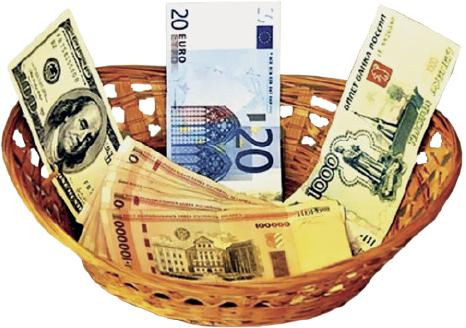 As for Belarus, the process is slowly continuing, whilst economists remain undecided as to which option would suit Belarus best, remaining in the currency market as at present or a path towards monetary dictatorship. The Japanese Yen, British Pound, Argentinean Peso and even the Swedish Krona fell this year. The Kazakhstani Tenge, Armenian Dram, Ukrainian Hryvna and the Russian Rouble were similarly affected. The Georgian Lari has also found itself in a weakened position. The obvious exception is the Russian Rouble, strengthened only towards Hryvna, which this year was devalued by 100 percent. The Belarusian Rouble against this background shows an almost ideal straight line: during the year a range of complex measures have been implemented with a view to gain control over the rate of inflation. The national currency has weakened against the Dollar by less than 15 percent. Nonetheless, no matter how strong the Rouble appears, financial shocks experienced by one’s neighbours directly affect our own industries.
As for Belarus, the process is slowly continuing, whilst economists remain undecided as to which option would suit Belarus best, remaining in the currency market as at present or a path towards monetary dictatorship. The Japanese Yen, British Pound, Argentinean Peso and even the Swedish Krona fell this year. The Kazakhstani Tenge, Armenian Dram, Ukrainian Hryvna and the Russian Rouble were similarly affected. The Georgian Lari has also found itself in a weakened position. The obvious exception is the Russian Rouble, strengthened only towards Hryvna, which this year was devalued by 100 percent. The Belarusian Rouble against this background shows an almost ideal straight line: during the year a range of complex measures have been implemented with a view to gain control over the rate of inflation. The national currency has weakened against the Dollar by less than 15 percent. Nonetheless, no matter how strong the Rouble appears, financial shocks experienced by one’s neighbours directly affect our own industries.
Export-oriented enterprises are now experiencing considerable difficulties because of devaluation in the CIS countries. The Ministry of Agriculture and Food provides detailed statistics. Minister Leonid Zayats recognises that because of weakening of the Russian Rouble, Belarusian farmers have already lost $160m. Regardless of whether the statistics are to include money not yet received, in the field of mechanical engineering for example, our industries, through no fault of their own, are losing their competitive edge in the international market. This issue has understandably been the subject of heated debate between the National Bank, the Government and various economists. The central point under discussion revolves around devaluation and exchange rate policy.

Belarusian Rouble in the basket of international and national currencies
Analyst Vadim Iosub considers that it would be a good time to increase the flexibility of the Belarusian Rouble, but concedes that for many, the word ‘flexibility’ immediately conjures images of devaluation. He explains that the two are not identical; the flexibility of rate means only that it changes under the influence of supply and demand, and it becomes the market rate. A similar scheme is already registered in the policy of the National Bank. He points out, “Many people remember the crisis of 2011, which in many respects was promoted by the behaviour of our citizens. The effect of crowds and thoughtless buying of currency led to a serious gap in rates, in many banks Dollars were not available and there were different currency speculators operating in the ‘grey’ market. In response to this the rate simply became the market rate. In order to avoid the same situation in 2-3 years time, economists and financiers recommend the introduction of a free rate and consideration given to ‘monetary dictatorship’ policies.” Certainly, any fluctuations in the Rouble rate will affect a range of different groups: some effects are felt by exporters, others by importers, equally investors are affected. Similarly, according to Mr. Iosub, the creation of a currency corridor and single definition for all currency baskets, instead of for separate currencies, would be an effective step.
Returning to the issue of the devaluation of our neighbours’ currency, the Russians have an interesting policy. The Russian analyst Alexander Razuvaev, gives the following figures: according to recent researches, only 7 percent of citizens actively buy currency in conditions of a constantly weakening Rouble. “Nobody wants to undertake the risks of other countries. After all, people realise that the rate can ‘act’ freely. Now we are not 90th in the system, our banking system is well-coordinated, therefore people do not have to panic.” According to the experts however, devaluation in Russia today will lead to exports between us becoming unprofitable for Belarusian manufacturers.
By Galina Konovalova











